The final video is too big in size to place on the blog. I learnt a lot from doing this assignment. Fro semester one I learnt how to do modelling techniques which came in very useful when doing this assignment because I enjoyed doing the modelling.
I have learnt a lot from this course because I had never done animation before. Using a biped was very new to me. I found this very easy to do. Skinning was very difficult but now I knew how to do it, it will not be so difficult in the future. The animation was very difficult as well, I know understand a lot of the skills needed to make an animation look good. All of these skills will be very useful to me in the future because I might go into a job where I will need all these skills. I can also put the work into a portfolio for the future.
If I could do this project again then I would do things a little differently. I would make sure the biped is placed in properly to make sure that the animation and walking tool work well. I would also perfect the skinning before moving on to the animation. I would also not spend so much time on the modelling, because if the skinning and biped stages are not done properly then there is no need to make sure the model looks good because it will be distorted in the end.
Friday, 7 May 2010
Editing
The editing took a very long time as the program was being very awkward. It was very difficult to preview the clips and what I had done in Premiere Pro because it was going very slow and kept jumping. I had to judge as best as I could what would look good. After I had arranged the clips, I then exported it to see what it looked like. After I had done this, I understood what the sound needed to be like. I went back, edited the sound and then exported the media again using the setting available on the program. The title page was really difficult to do because ive had no experience before with Premiere Pro. I eventuallly settled with a plane title.
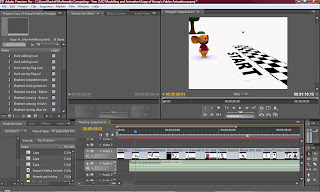

Rendering
The duck walking in was the first render I did. When I saw the finished result I was very happy. It took four hours to render this scene. For this I knew I had to be quick with the animation because the rendering would take a very long time and I wouldn't have the time to finish. Other renders took a very long time. The longest render took 17 hours to complete 560 frames. This meant that I had to continue rendering through the night.
This image shows how many renders I had to do to make sure I had everything I needed to start video editing. Each render took a minimum of 4 hours. Some even took 17 hours.
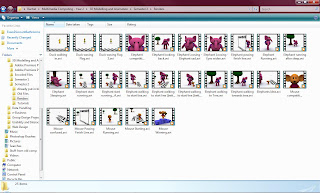
This image shows how many renders I had to do to make sure I had everything I needed to start video editing. Each render took a minimum of 4 hours. Some even took 17 hours.

Cameras
The cameras came very useful during the animation and rendering. Once I knew the camera angle I wanted to render from I set a camera in the view and then pressed P on the keboard to come out of it and carry on editing. It also came in useful when more then one camera was needed on a file with more than one render needed. Below shows a file which had two cameras and it shows how I used them.
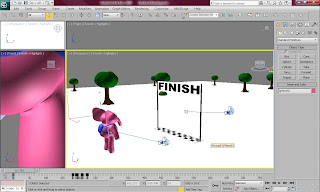

Visability Tool
One tool which came in very handy on many occasions was the Visability option. On many occassions I needed objects to disappear and reappear. This particularly came in very handy when making the characters blink. I could do this by adding a track and setting it to disappear at certain points on the timeline and then reappear later. This also came in very useful for when the characters were thinking. Look at the print screen below to see how I achieved this effect.
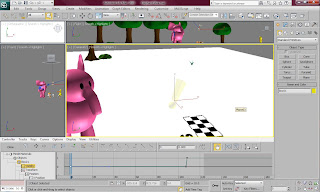

Footsteps
Footsteps were the most difficult part of the animation to do. I used the footstep mode to create footsteps for the characters to walk and run. I also used the convert tool to make sure I could edit the strides and the body posture. For the mouse I had to continuously bring the footsteps together because it kept on walking on its knees. For the elephant it would throw it's arms in towards its body. Because of this I had to make separate layers for his arms to make sure they were not hidden inside its body. The duck was the easiest to make walk because the only thing it did wrong was throw its arms inwards. The elephant was definatly the hardest as during the footsteps it kept bending its knees backwards and throwing its legs in random places. I solved this by using the convert tool and frame by frame, made sure that this would no happen.
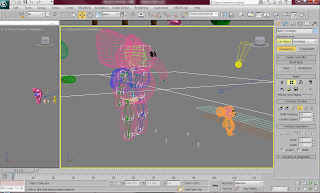

Moving objects
This was by far the easiest animation I had done throughout the project. To make the characters look like they were running without making them move a lot. I simply grouped the background and set autokey. I then made a keyframe at 0 and moves the slider to a particular number when the charcter had stopped moving. I then moved the background to its finishing position. This was all i needed to do.
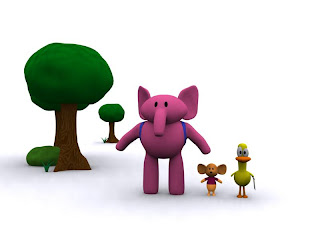

Subscribe to:
Posts (Atom)


